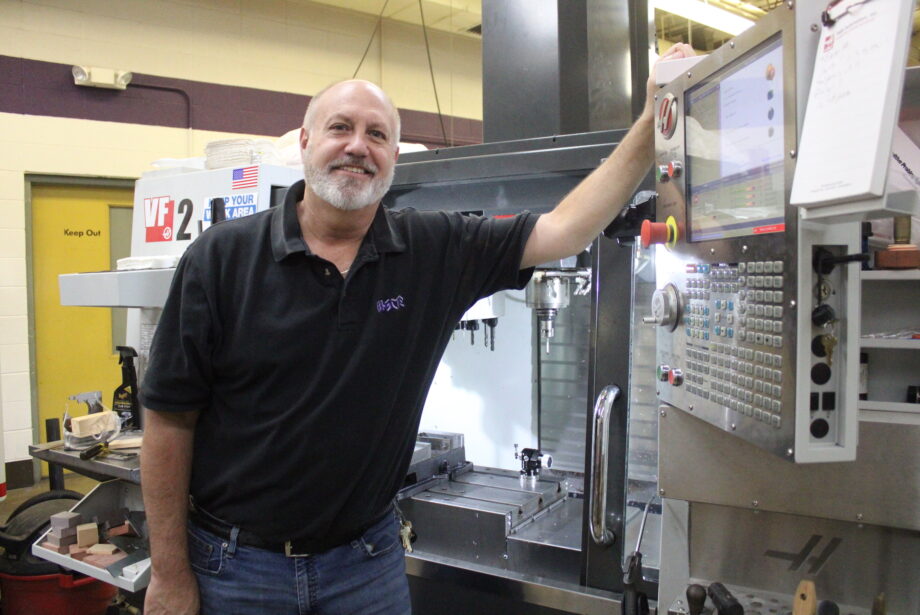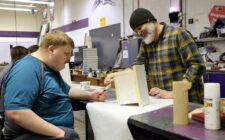Long-time industrial tech teacher leaves lasting legacy.
On the evening of June 3, as the Burlington High School class of 2023, diplomas in hand and hats in the air, looked toward their family and friends in the bleachers, a loud boom reverberated through Bracewell Stadium.
Standing behind the cloud of purple smoke billowing from the cannon was Tom Buckman. Though he couldn’t be seen by those below, one can safely assume that Buckman grinned, perhaps even laughed at the unsuspecting crowd’s startled reaction.
“He’s widely known as the guy who makes the loud boom at home football games and enjoys watching the opposing teams duck and cover,” BHS Monica Myers said of Buckman during Burlington Community School District’s 44th annual Staff Retirement Banquet at The Drake, where Buckman, a Diet Coke in hand, sat alongside his wife, Lori.
But Buckman is perhaps more widely known for his ability to empower the students in his classroom.
At another graduation ceremony in 2016, class valedictorian Bobby Kemp described the now-retired teacher as “the man, the myth, the legend,” before recalling his experience in his class as one that encouraged him to teach himself, and one that made him want to learn.
Hunter Craig, now a BHS graduate, who has taken Computer Integrated Manufacturing, Precision Machining and Manufacturing Production, Machining and Manufacturing, and Engineering Design and Development with Buckman, said Buckman’s style of teaching has encouraged him to think for himself.
“Unlike many other teachers who provide a single correct answer or a prescribed path to follow, Buckman encourages independent thinking and self-discovery,” Craig said. “He empowers his students to explore and find information on their own, fostering a sense of autonomy and confidence. This approach has taught me the importance of being resourceful, adaptable, and capable of solving problems through my own efforts. It has been a transformative lesson that will undoubtedly serve me well in all aspects of life.”
Buckman said the subject matter he has taught helps motivate students to want to learn, as does respect.
“I treat all of my students like the adults they think they are and I made sure that I walked the walk and talked the talk so they wanted to learn what I know and what I possess, so they were hungry or thirsty for what I had, not be just lecturing and expecting them to sit there and absorb what I’m spitting out,” Buckman said in mid-May during one of his planning periods, the lines of awards and stacks papers lining the desk and filing cabinet behind his desk shorter than they had been weeks earlier as he worked to clear out his things. “I make them want to be in here. The worst thing I could do is not teach.”
As Buckman spoke, Sara Parris had come down the hallway from her CAD class to sub for welding teacher Pat Pickford in the shop area connected to Buckman’s classroom.
Encouraging the next generation
Parris was a student of Buckman’s in high school, first as a freshman in Metals I.
“Being a freshman, of course, is terrifying, but (Buckman) had one of those presences that’s like ‘welcome to the class; you’re going to love it,’” Parris recalled before holding up the speedhound keychain that she made in Buckman’s class during the 2009-’10 school year.
She would continue to learn from Buckman over the following three years, both through the Student Technology Association, of which Buckman was an advisor, and in her senior year when she took Metals II.
“I did all the coding and stuff that you don’t think you can do and then he’s kind of like, well, you can do it.’ He’s definitely like anybody can do this, anybody can come in and learn. You don’t have to be a shop kid,” said Parris, who described herself instead as having been a choir kid.
Buckman’s encouragement and her new-found abilities in the shop kept Parris wanting to take industrial tech classes. In college, she was a math major. Then she ran into Buckman.
“I ran into him somewhere or I had a phone call with him or something and I was like, you know, I think I want to be a shop teacher,” Parris said. “And it was kind of one of those things where he said go for it.”
Parris student-taught under Buckman before becoming a teacher, at which point he became her mentor.
“We kind of went full circle from student to mentee” she said. “He’s definitely helped make me a better teacher in a sense, so I don’t want to say inspiration to getting into it, but definitely wanting to stay. He’s also really good at pushing me to make everything better. We would have conversations like this is why I want to teach and he would be like, ‘how do you make it better?’ ”
It’s a question Buckman’s asked of himself time and time again throughout his teaching career.
“Since I started here, if I had to go back and watch myself teach my first year at BHS, it would be painful because I would be embarrassed by what I was teaching and how I was teaching, because every year for 36 years, I have raised that bar and raised those expectations and raised the amount of knowledge that they need to learn to keep up with technology and keep up with things going on, and I would say that to any beginning teacher,” Buckman said. “If you are not constantly raising that bar, raising those expectations, you’re doing your students a disservice when they graduate because our job is to prepare them for today’s world, and if you’re not going back to school, taking classes, keeping up with new technology, keeping pace of technology that’s emerging, then you’re not doing your job.”
From BPD to BHS
A native of South Holland, Illinois, Buckman first came to Burlington in May of 1986, not as a teacher, but as an intern for the Burlington Police Department after double majoring in law enforcement administration and industrial education at Western Illinois University.
“I had wanted to be kind of like the (school resource officer), but they didn’t have an SRO program at Burlington,” Buckman recalled.
So he spent the summer of ‘86 alongside officer Tom Walz before returning to Chicago that fall to student-teach for a semester at Thornridge High School. In January 1987, he took a job at the PACE Alternative School, which at the time serviced 10 school districts in Chicago’s southern suburbs.
In his second year there, he helped to organize and form a union, an effort that ultimately resulted in significant pay hikes for him and his colleagues. Still, the cost of living in the downtown Chicago area was high, so Buckman got a second job. His days were spent at school, and his nights were spent as a suit and tie house detective officer at the Fairmont Hotel.
It was while he was working at the hotel that he received a phone call informing him that Officer Walz had been shot while responding to a burglary. The news brought Buckman back to Burlington to visit his mentor.
“It was at that time he kind of tried to convince me to come back and quit working 16 hours a day just to pay rent,” Buckman said. “Strangely enough, in The Hawk Eye, there was a job listing for industrial ed here at BHS. I don’t know if you’d call that fate or what.”
He got the job and worked in that position for a year before he was laid off due to a reduction in force, then long-term subbed for a year before being recalled back to a full-time position in 1992, this time as a special education teacher.
After two years in that role, he moved back into industrial ed. He’s been in the machine shop at BHS ever since, attending the International Manufacturing and Technology Show in Chicago every other year to keep up with emerging technology and working
to modernize the shop at BHS to prepare his students for the workforce.
Equipment upgrades give students a leg up
Buckman estimates his now former classroom holds upwards of $1 million worth of digital precision machining equipment, but that wasn’t always the case.
“When I got here, the machine shop had leftover machinery from the Iowa Army Ammunition Plant, so everything was surplus 1930s, 1940s, and even said ‘U.S. War Department’ on some of them,” Buckman said.
Buckman began partnering with local companies to get new machinery, and when one of those partners, Murray Turbo, left town, it donated a surface grinder, a vertical mill, and other machinery used to upgrade the shop. Further aiding the effort to better prepare students for the workforce with up-to-date machinery were Carl Perkins grant funds.
In 2000, the decision was made to go all digital in an effort to keep up with industry standards. The purchase of a Cincinnati machine in 2000 was followed by a Flow 40,000 PSI water jet in 2002, then a Haas vertical milling center in 2015, then a 400-watt laser in 2018.
“Now, 16 machines in the shop are all digital,” Buckman said. “That helped bridge kids from mechanical running a plain machine to a digital machine. Now students are leaving here fully digital. Everything’s a dial caliper, everything’s digital, so when students walk into industry, they are off and running, which is good. I’ve had a lot of students be able to get some really good jobs because they were up to speed and knew what they were doing.”
But BHS industrial tech students are showing their know-how before they leave high school.
BHS junior Adam Johnson recently earned a perfect score on his final exam assessment for Project Lead The Way’s Computer Integrated Engineering Program, placing him in the 99th percentile nationally, and Craig has completed an impressive number of challenges put out by the Titans of Machining Academy.
“Buckman has played a crucial role in preparing me for life after high school,” Craig said. “His guidance and expertise have equipped me with practical skills that are applicable not only in the fields he teaches but also in various aspects of life. His classes have instilled in me a strong work ethic, problem-solving abilities, and critical thinking skills that will benefit me in any future endeavors, including college and beyond.”
A resonating message
Buckman sees his former students on the job when he visits places like Case New Holland and frequently runs into BHS graduates who are more than happy to tell him about their lucrative careers in industrial tech.
“They get that self worth,” Buckman said of his students. “I think the biggest thing I’ve been able to teach the kids is what I’m teaching you, you can go make money, so learn what I’m teaching you, learn these skills, and you can find somebody who will pay you for what you know and the skills you have. I think that’s probably one of the best quotes that I’ve said to students over the years is when you graduate high school, you have to find somebody to pay you for what you know and the skills you have, so if you have no skills and don’t know anything, you better think long and hard about what you’re doing here in high school to invest in yourself, because no one else is going to invest in you when you graduate.”
It’s something he’s told hundreds of classrooms.
Outside the classroom
Outside of teaching, Buckman has been a TSA advisor for nine years, once being named the TSA Advisor of the Year during a trip to Baltimore. He also has been a sophomore basketball coach for 10 seasons and has bee a longtime member of the Burlington Education Association, having served as president, vice president and chief negotiator.
He was heavily involved in negotiations over the most recent BEA contract and has served as the district’s unofficial historian.
He also has been a strong advocate for Career and Technical Education programming and served as the CTE chair when
industrial arts merged with business, home ec, and health professions programs.
He was heavily involved in implementing the ProStart program, along with internships and job shadowing for the business
department, DECA and HOSA.
In his retirement, he plans to do model trains with his dad, Charles Buckman, who himself was an industrial tech teacher, do some traveling, and continue working as a fireworks technician for J and M Displays.
He had planned to let his teaching license expire, but Gov. Kim Reynolds recently signed into law House File 672, effectively eliminating renewal requirements for teachers who have been employed for at least 10 years and for those who possess masters or doctoral degrees.
“I was deliberately allowing it to expire. Deliberately, and she’s going to sign a bill that says well you’ve got a master’s teaching certificate, so it’s good forever. You don’t have to renew it anymore,” Buckman said. “The train was rolling into the station and I was all ready to get off and all of a sudden it’s going to speed back and pick up again and not stop. I’m going to have to make a jump for it and roll.”
While Buckman may be ready to roll, Parris thinks of it a little differently.
“He can’t officially leave because I’m going to call him.” she said. “Once a shop teacher, always a shop teacher.”













